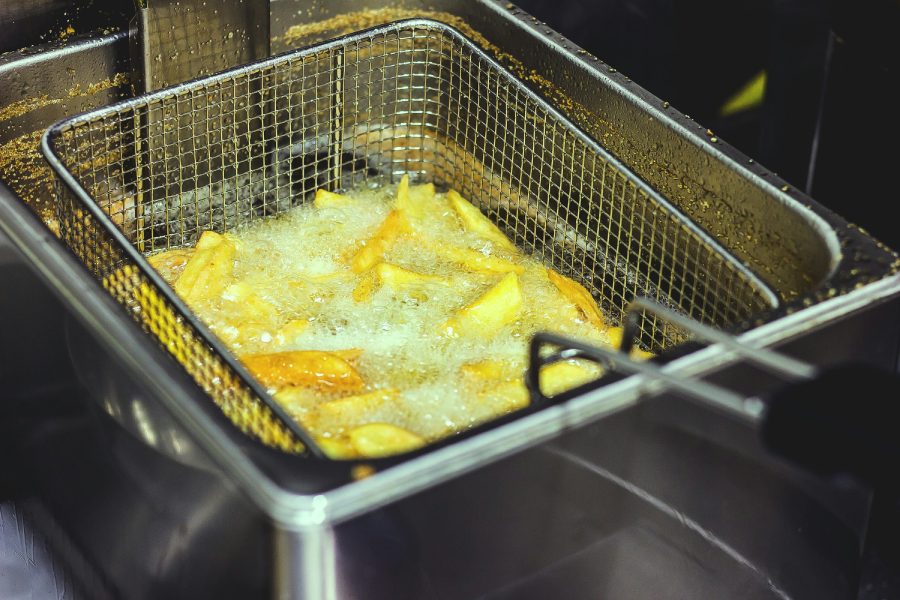Transformando óleo de cozinha em produtos químicos úteis usando microondas

Pesquisadores da Universidade de Kyushu demonstraram que um material de zeólita, o Na-ZSM-5, pode aprimorar a conversão química de biomassa em olefinas - um precursor fundamental na produção de plásticos, produtos farmacêuticos e outros produtos - usando aquecimento por micro-ondas. Seu estudo, publicado na revista Jornal de Engenharia QuímicaA análise do desempenho do produto, que sugere que esse método poderia proporcionar uma abordagem mais sustentável e eficiente em termos de energia para a fabricação de produtos químicos.
Os métodos atuais de síntese de precursores químicos, como a reforma da nafta, consomem muita energia e resultam em emissões significativas de dióxido de carbono. Em contrapartida, o uso de óleos residuais, como óleo de cozinha e óleos de microalgas, oferece uma alternativa mais sustentável. No entanto, esses óleos exigem um processo chamado craqueamento catalítico, geralmente usando catalisadores de zeólita, para serem convertidos em produtos químicos mais simples. Esse processo convencional requer temperaturas de até 500-600°C, o que não apenas consome uma grande quantidade de energia, mas também resulta em depósitos indesejados, ou "coqueificação", que reduzem a vida útil do catalisador.
A equipe de pesquisa, liderada pelo Professor Associado Shuntaro Tsubaki da Faculdade de Agricultura da Universidade de Kyushu, explorou o uso do aquecimento por micro-ondas como uma alternativa aos métodos convencionais. Ao contrário dos métodos tradicionais de aquecimento, as micro-ondas interagem diretamente com os materiais, fornecendo energia direcionada. Essa abordagem pode reduzir o consumo de energia e aprimorar as reações catalíticas gás-sólido por meio do aquecimento seletivo do material catalisador.
Os pesquisadores testaram vários catalisadores de zeólita para identificar aqueles que poderiam ser aquecidos com eficiência por micro-ondas e, ao mesmo tempo, manter um alto desempenho catalítico. Sua análise identificou o Na-ZSM-5, um zeólito substituído por íons de sódio, como um catalisador particularmente eficaz para essa finalidade. Em experimentos que compararam o aquecimento por micro-ondas com o aquecimento convencional, o Na-ZSM-5 apresentou desempenho superior, alcançando alta eficiência de conversão de ésteres de ácidos graxos em olefinas e minimizando a produção de dióxido de carbono.
É importante ressaltar que o estudo constatou que o aquecimento por micro-ondas resultou em uma produção de olefinas quatro vezes maior do que o aquecimento convencional, mesmo na mesma temperatura de 500°C. Além disso, o processo de micro-ondas não levou à formação de coque, mesmo em temperaturas tão altas quanto 600°C. Essa melhoria foi atribuída à criação de pontos quentes localizados dentro da estrutura do zeólito, com temperaturas superiores a 1.000 °C, enquanto a temperatura do material em massa permaneceu em 500 °C. Essas altas temperaturas localizadas provavelmente contribuíram para a produção seletiva de olefinas.
Os pesquisadores sugerem que o aquecimento por micro-ondas pode desempenhar um papel importante para tornar os processos químicos mais sustentáveis, reduzindo o consumo de energia e as emissões. Esse método se alinha com as metas mais amplas do setor químico para reduzir seu impacto ambiental, confiando mais em fontes de energia renováveis.
A equipe planeja continuar a refinar os processos catalíticos acionados por micro-ondas para melhorar ainda mais a eficiência e a escalabilidade, possivelmente introduzindo práticas novas e mais sustentáveis na fabricação de produtos químicos.


Respostas